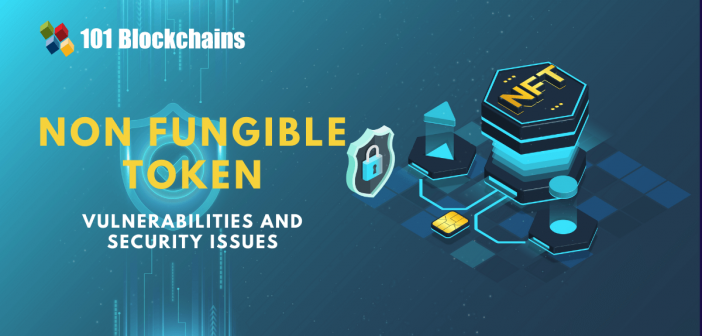Learn how blockchain truly works, master key definitions, and uncover what makes smart contracts so "smart." Dive into the fundamentals, gain valuable insights, and start your blockchain journey today!

- Guides
Diego Geroni
- on December 03, 2021
Know the Vulnerabilities and Security Concerns Associated with NFT
Thinking about the security of NFTs? Let’s demystify the NFT vulnerabilities and security concerns to clear your doubts!
Non-fungible tokens have been in the highlights since the beginning of 2021. A $69 million NFT sale was one of the most striking pieces of news, which brought everyone’s eyes to NFTs. However, people are apprehensive about NFTs and are asking the question “Are NFTs safe?” before forming an opinion about them. As a new class of digital tokens, NFTs introduce many prolific benefits like improved control and ownership of digital assets.
In addition, NFTs are also playing a crucial role in improving the liquidity of traditionally illiquid addresses. However, there are many NFT vulnerabilities and security concerns that might miss your attention amidst all the noise around NFTs. The following discussion helps you discover some of the prominent vulnerabilities and security risks associated with NFTs.
Why Should I Bother about NFTs?
For beginners, NFTs is an acronym for Non-Fungible Tokens, which refer to a group of unique assets in the domain of crypto. They are different from tokens with “fungibility” or the tokens which are equal in value. Furthermore, fungible tokens are not distinguishable from each other.
A clear understanding of the definition of non-fungible tokens could help in setting the perfect foundation for learning about NFT security issues and vulnerabilities. You can find the best example of a fungible token in Bitcoin. You could buy another Bitcoin for one Bitcoin and still have ownership of one Bitcoin. On the other hand, NFTs are a completely different game altogether.
The value of NFTs depends on different factors, including total supply and minting number alongside other special highlights and community support. For example, you would never find two similar CryptoKitties with the same worth. The value of CryptoKitties depends on the minting number, time of the creation of the kitty, and special highlights alongside demand. So, basically, NFTs are unique digital tokens that can help you exercise complete control over your assets.
Learn the concept, elements, future and use cases of NFTs from the E-book: Non Fungible Tokens (NFTS) – A Definitive Guide
Popularity of NFTs
The popularity of NFTs has skyrocketed in recent times with their unique traits for associating value to any physical or digital asset. You can think of NFTs as tokens representing physical or digital assets on a blockchain network. The NFTs record ownership of assets on the blockchain network. At the same time, the growth of NFTs has been fuelled by the creation of exclusive communities related to specific assets.
On top of it, NFTs also encourage investors for the creation of a future that relies largely on a tokenized economy. Despite being in the early stages, NFTs are transforming the domain of crypto in various ways. However, NFT security concerns are inevitable aspects, just like with anything that involves technology, humans, and money. Therefore, it is important to look at the dark side of NFTs for identifying the pitfalls in the emerging technological intervention.
Understanding the Security of NFTs
One of the foremost aspects which emerges in any discussion about NFTs is “Are NFTs safe,” and there are many reasons for such doubts. Well, the answer to the question might not be appealing as NFTs are not completely secure. First of all, it is important to note that malicious actors would immediately capitalize on any opportunity for exploiting any asset with value. Even if NFTs are still in the initial stages of growth, their popularity has become a signaling beacon for hackers. Furthermore, various real-life incidents also draw attention to the severity of NFT vulnerabilities and threats to NFT security.
Hackers were able to gain unauthorized access to various Nifty Gateway NFT user accounts in March 2021. During the attack, hackers transferred previously purchased NFTs and bought new NFTs for transferring with the payment cards available on file. The attackers sold the NFTs to another purchaser on a different platform. Since Nifty Gateway held the private keys for concerned NFTs on the platform, users were not able to recover NFTs. Such incidents not only bring clarity regarding NFT security concerns but also towards other challenges in the NFT ecosystem.
Want to know more about NFT? Enroll Now in NFT Fundamentals Course
NFT Vulnerability and Security Concerns
Although the popularity of NFTs is increasing day by day, hacking incidents make it important to understand the NFT security issues. Let us find out more about the individual challenges, vulnerabilities, and security risks evident for NFTs in present times.
-
Challenges for Asset Ownership
The creation of NFTs introduced new prospects for transforming conventional precedents for asset ownership. However, one of the foremost NFT vulnerabilities challenges the very concept of true ownership in NFTs. The foremost challenge at the time of the creation of NFTs was the limitation on storage capabilities. As a result, it was impossible to store images in the blockchain.
On the contrary, the blockchain would store an identifier of the image, which can be the hash of the image or its web address in the blockchain. You would have to use the identifier for viewing the NFT on a third-party platform. So, an individual purchasing an NFT would not be purchasing the actual image. On the contrary, they are purchasing the identifier, which leads them to a URM on the internet. The identifier could also lead to the Interplanetary File System (IPFS).
When you think of IPFS, it is important to note that the company from which you bought the NFT would be running the IPFS node. So, you can clearly notice one of the foremost NFT vulnerabilities in scenarios where the platform minting the NFTs goes out of business. In such cases, you would lose access to the NFT, or the NFT might lose its value.
Become a member now to watch our on-demand webinar on Demystifying Non-Fungible Tokens (NFTs).
-
Marketplace Security Risks
While NFTs are based on blockchain technology, they depend on centralized platforms, which help people interact with digital assets. You can find different centralized platforms such as Nifty Gateway and Open Sea as suitable portals for buying and selling NFTs. However, one of the formidable NFT vulnerabilities and security concerns emerges due to these centralized platforms.
The centralized platforms like Nifty Gateway and Open Sea store the private keys associated with all assets on the platforms. As a result, any type of compromise in the platform would automatically imply the loss of NFTs. The example of the attack on Nifty Gateway in March shows how attackers were able to capitalize on this vulnerability. Despite the recovery of money of the victims, they were not able to recover the NFTs, thereby implying a formidable risk.
On the other hand, it is also possible to argue in support of strong security measures on NFT marketplaces. However, strong security measures by the marketplace might not be adequate for addressing NFT security issues in using centralized marketplaces. Platform users might be responsible for exposing many other vulnerabilities in security of NFT marketplaces. Weak passwords or the lack of two-factor authentication can be some of the reasons for which users can lose their valuable NFTs.
Curious to know about the future applications of NFTs? Check out our guide on Future Applications And Challenges Of NFT right now!
-
Cyber Security and Identity Fraud
The next formidable entry among NFT security concerns points towards cyber security issues and possibilities for identity fraud. One of the foremost cyber security issues noted with NFTs would refer to cryptocurrency scams. An example of such a threat has been evident in a scam involving high-volume email.
Apparently, the high volume of emails is presented as if they are being sent by Coinbase regarding suspicious activity in their Coinbase accounts. Users are asked to open an attachment in the email, which asks them to provide the password for login and verifying their account. Such scams can end up compromising the credentials of a user on an NFT platform. Malicious actors could also leverage such NFT vulnerabilities for implanting malware such as remote access Trojans in the user’s machine.
-
Smart Contract Risks
Smart contracts are the most fundamental aspect in the design of NFTs and are the reason for prominent NFT security issues. As a matter of fact, smart contract risks and the concerns of NFT maintenance are notable factors you can identify in the existing NFT market.
One of the recent incidents involving an attack on a renowned DeFi protocol, Poly Network, shows the effect of smart contracts risks on NFT security. Hackers were able to steal almost $600 million in the attack, only due to setbacks in smart contract security. Interestingly, Poly Network is not the only example showcasing NFT vulnerabilities and security concerns clearly.
The most popular NFT project, CryptoPunks, had to face the implications of smart contract vulnerabilities in 2017. In 2017, CryptoPunks was affected by a bug that prevented the transfer of ETH into the seller’s wallet. Attackers could leverage the bug for purchasing CryptoPunks NFTs and retrieve back the money from the contract. Therefore, CryptoPunks had to launch again with a completely different and newly updated smart contract.
Want to learn about the critical vulnerabilities and security risks in smart contract development? Enroll in Smart Contracts Security Course now!
Bottom Line
Non-fungible tokens are obviously a smart evolution in the type of digital assets. They bring the benefits of uniqueness and better control over digital assets alongside the functional traits of blockchain technology. However, the NFT vulnerabilities and security concerns identified commonly can be huge setbacks for their adoption.
On the contrary, it is completely unreasonable to dismiss NFTs only due to their security concerns and vulnerabilities. As a matter of fact, you should look for solutions that can help you obtain a better impression of NFT smart contract vulnerabilities. Furthermore, you can also depend on tools for alerts about any suspicious activities on NFT marketplaces and in your accounts. Learn more about NFTs for identifying their vulnerabilities more clearly.
If you really want to understand the concepts of NFT, you must enroll in NFT Fundamentals Course.
*Disclaimer: The article should not be taken as, and is not intended to provide any investment advice. Claims made in this article do not constitute investment advice and should not be taken as such. 101 Blockchains shall not be responsible for any loss sustained by any person who relies on this article. Do your own research!







